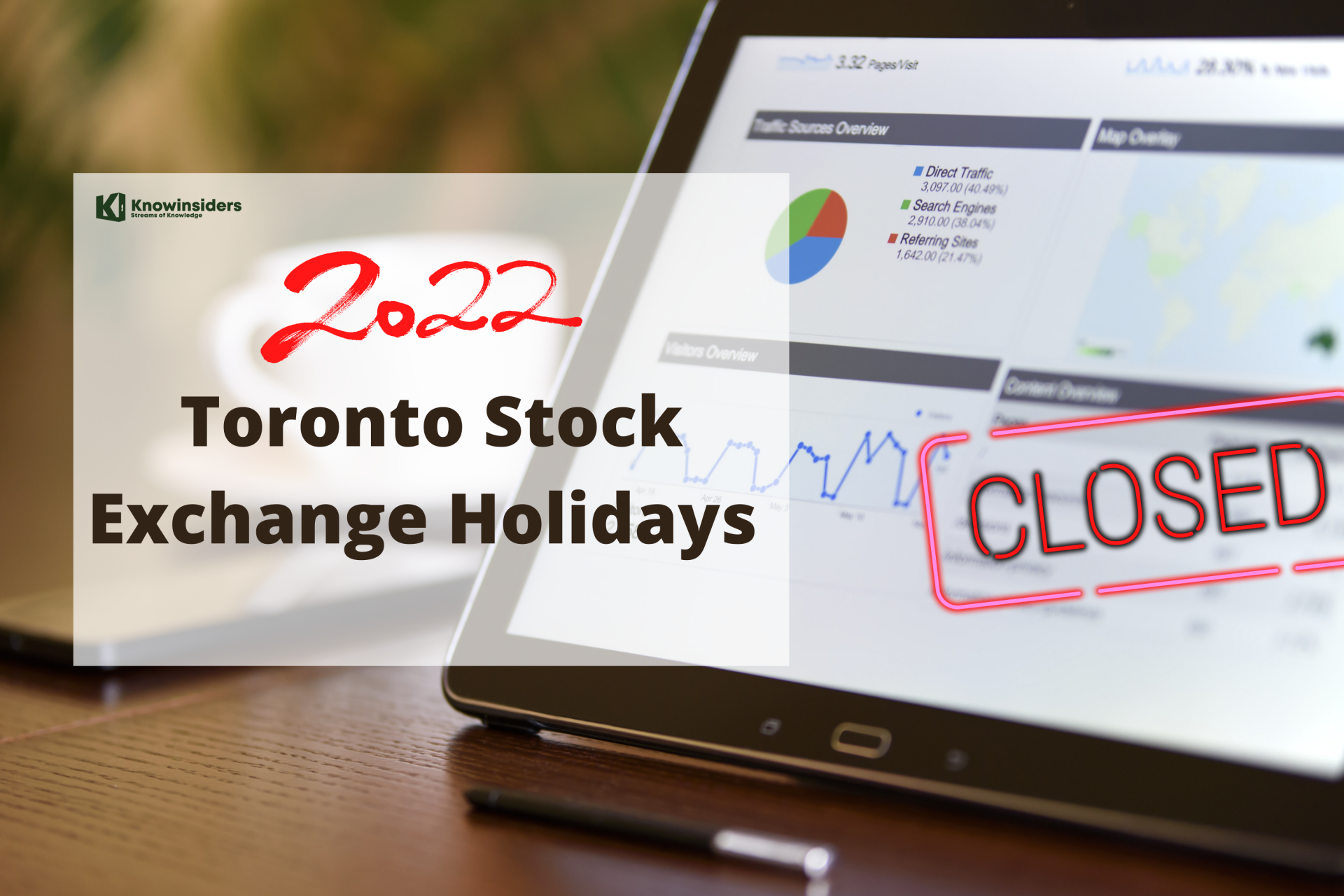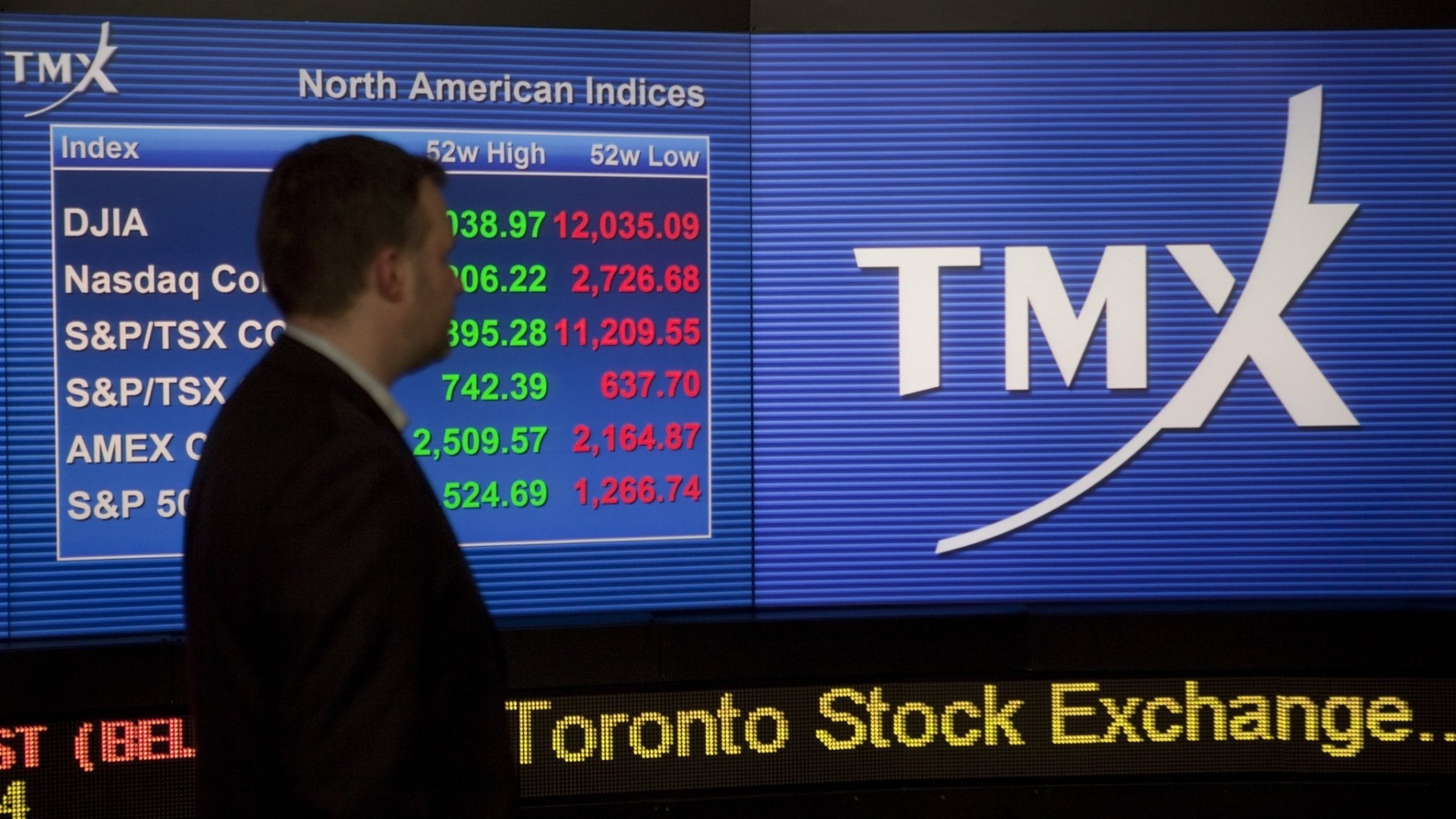What Holidays are Canada Stock Market Closed
 |
| Photo: KnowInsiders |
What is Canada Stock Market?
The Toronto Stock Exchange (TSX; French: Bourse de Toronto) is a stock exchange located in Toronto, Ontario, Canada. It is the 11th largest exchange in the world and the third-largest in North America based on market capitalization.[4] Based in the EY Tower in Toronto's Financial District, the TSX is a wholly-owned subsidiary of the TMX Group for the trading of senior equities. A broad range of businesses from Canada and abroad are represented on the exchange. In addition to conventional securities, the exchange lists various exchange-traded funds, split share corporations, income trusts and investment funds. More mining and oil and gas companies are listed on Toronto Stock Exchange than any other stock exchange.
2022 Toronto Stock Exchange Market Holidays
| Holiday | Date | Status |
|---|---|---|
| New Year's Day | Monday, January 3, 2022 | Closed 1 month from now |
| Family Day | Monday, February 21, 2022 | Closed 2 months from now |
| Good Friday | Friday, April 15, 2022 | Closed 4 months from now |
| Victoria Day | Monday, May 23, 2022 | Closed 5 months from now |
| Canada Day | Friday, July 1, 2022 | Closed 7 months from now |
| Civic Day | Monday, August 1, 2022 | Closed 8 months from now |
| Labor Day | Monday, September 5, 2022 | Closed 9 months from now |
| Thanksgiving Day | Monday, October 10, 2022 | Closed 10 months from now |
| Christmas | Monday, December 26, 2022 | Closed 1 year from now |
| Boxing Day | Tuesday, December 27, 2022 | Closed 1 year from now |
Note: All holiday occurrences are subject-to-change. While we make every effort to maintain accurate and up-to-date information on the website, we cannot be held responsible for inaccuracies or the results of using any information on the website.
Rest of 2021 Toronto Stock Exchange Market Holidays
| Christmas | Friday, December 24, 2021 † | Open, 9:30am - 12:50pm ‡ 4 weeks from now |
|---|---|---|
| Christmas | Monday, December 27, 2021 † | Closed 1 month from now |
| Boxing Day | Tuesday, December 28, 2021 † | Closed 1 month from now |
Why invest in TSX stocks?
Canadian stocks collectively had a value of $3.2 trillion as of December 2020, accounting for approximately 4% of global market capitalization.7 Although only one-tenth of the size of the $35.5-trillion U.S. equity market, Canada has a disproportionate number of world-leading companies clustered in three critical sectors – financials, energy and materials.8 Most of these companies have solid balance sheets, sound management, and long-term records of growth and profitability.
While the benchmark TSX Composite index has approximately 250 stocks, a sub-set of this index – the TSX-60 – consists of the best Canadian blue chips.
How does one invest in TSX stocks?
 |
| Photo: Financial Times |
There are two basic avenues of investing in TSX equities:
• Interlisted stocks: Interlisted stocks are those that are dually listed on a Canadian exchange like the TSX and on a U.S. exchange such as the New York Stock Exchange or Nasdaq. The major benefit of interlisted stocks to the U.S. investor is that it they can be purchased in U.S. dollars. More than three-quarters of the 60 stocks that comprise the TSX-60 blue-chip index are interlisted (including all the ones mentioned in the previous section).9 In fact, many of these interlisted stocks have the same ticker symbols on Canadian and U.S. exchanges. Altogether, almost 180 Canadian stocks are interlisted on U.S. exchanges.
• Exchange-traded funds and mutual funds: ETFs and mutual funds are another popular methods of investing in a basket of TSX equities. For example, the iShares MSCI Canada ETF is a $3.6-billion ETF that has been around since March 1996. This ETF’s investment objective is to track the investment results of an index composed of Canadian equities. Its top ten holdings as of October 6, 2020, were – Shopify, Royal Bank of Canada, Toronto-Dominion Bank, Canadian National Railway, Enbridge, Bank of Nova Scotia, Barrick Gold Corp, Brookfield Asset Management, Canadian Pacific Railway, and Bank of Montreal. The ETF has an expense ratio of about 0.49%, making it an efficient way to invest in TSX stocks.
The ten most important points about stock investing in Canada
Stock investing is a great way for Canadians to build wealth, but it can have its pitfalls. This list spells out the essentials every stock investor should remember.
• You’re not buying a stock; you’re buying a company.
• The primary reason you invest in a stock is because the company is making a profit.
• If you buy a stock when the company isn’t making a profit, you’re not investing — you’re speculating.
• A stock (or stocks in general) should never represent 100 percent of your assets.
• In some cases (such as a severe bear market), stocks aren’t a good investment at all.
• A stock’s price is dependent on the company, which in turn is dependent on its environment, which includes its customer base, its industry, the general economy, and the political climate.
• Your common sense and logic can be just as important in choosing a good stock as the advice of any investment expert.
• Always have well-reasoned answers to questions such as “Why are you investing in stocks?” and “Why are you investing in a particular stock?”
• If you have no idea about the prospects of a company (and sometimes even if you think you do), always use stop-loss orders.
• Even if your philosophy is to buy and hold for the long term, continue to monitor your stocks and consider selling them if they’re not appreciating or if general economic conditions have changed.
Top ten websites for Canadian stock investorsThe web is full of sites promising great stock investing information, but who can you trust? Here are ten sites that offer Canadian stock investors reliable, trustworthy stock investing news and commentary. Advice for Investors Bloomberg.com Canadian Securities Institute Canoe Money CNNMoney.com CNW Group MarketWatch Stockhouse TMX Group Yahoo! Finance |
The best financial measures for stock investing
Financial ratios help investors find stocks that offer good value by giving numbers meaning and putting them into perspective. If you’re considering investing in a company’s stock, ensure that the company passes these ratio tests.
• Price-to-earnings (P/E) ratio: For large-cap stocks, the ratio should be under 20. For all stocks (including growth, small-cap, and speculative issues), it shouldn’t exceed 40.
• Price-to-sales (P/S) ratio: This ratio should be as close to 1 as possible (or below 1).
• Return on equity (ROE): The ROE should be going up by at least 10 percent.
• Earnings growth: Earnings should be at least 10 percent higher than in the year before. This rate should be maintained over several years.
• Debt-to-asset ratio: Debt should be 30 percent or less compared to assets.
 What Holidays is the U.S Stock Market Closed 2022? What Holidays is the U.S Stock Market Closed 2022? The US stock market closes on some US holidays every year. Scroll down to know more about the holiday time, holiday schedules of the US ... |
 Only in China: First Sex Doll Hotel Closed With No Explaination Only in China: First Sex Doll Hotel Closed With No Explaination The first-ever sex doll hotel in Shenzen where men are welcomed to entertain with inanimate sex dolls has been closed down by police without explaination. |
 Fry's Electronics Shut Down: Complete Text of Statement, How Many Stores Closed and Reasons Fry's Electronics Shut Down: Complete Text of Statement, How Many Stores Closed and Reasons For tech enthusiasts, the news that Fry’s Electronics is shutdown is a really sad news. Check out the reasons, how many stores were closed after ... |


























